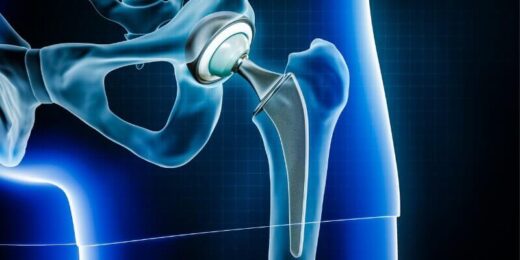There was a time when hip replacement was considered a last resort, something reserved for those well into their retirement years, when pain left no other choice. But today, that narrative is shifting. Increasingly, people in their 40s, 50s, and early 60s are saying “enough” to daily pain and stiffness, and “yes” to reclaiming their mobility and confidence through hip replacement.
So what’s changed? Why are more people opting for surgery earlier than ever before? Let’s explore how new medical advancements, changing lifestyle expectations, and a broader view of health are leading people from cane to confidence sooner rather than later.

When Everyday Pain Becomes a Daily Decision
Whether it’s struggling to get out of the car, feeling a jolt when climbing stairs, or avoiding long walks for fear of the aftermath, hip pain doesn’t just hurt, it infiltrates daily life.
You start to modify your routine. Shortcuts replace strolls. You lean on a cane or rely on painkillers. You turn down invitations because even sitting at a dinner table too long feels like a chore.
These small changes might not seem drastic at first, but over time, they add up. They steal your independence, your joy, and your confidence.
More and more patients are asking: Why should I wait until I’m older to feel like myself again?
The Old Thinking vs. The New Reality
In the past, surgeons hesitated to perform hip replacements on younger adults due to concerns about implant longevity. Artificial joints were expected to last 10–15 years, and a younger patient meant a higher likelihood of needing revision surgery later in life.
But thanks to modern implant technology including durable materials like ceramic-on-ceramic bearings and improved designs today’s prosthetic hips can last 20 to 30 years, sometimes even longer.
This evolution has reshaped the calculus: if a hip replacement can offer decades of relief and restore a person’s quality of life now, why delay it?
Who’s Choosing Earlier Surgery?
The new wave of patients includes:
- Working professionals whose job demands are impacted by limited mobility
- Parents and grandparents who want to stay active with their families
- Fitness enthusiasts who refuse to give up on movement
- Travelers and retirees-to-be who want pain-free exploration
- People with post-traumatic arthritis or congenital hip issues in mid-life
Many of these patients have spent years trying conservative treatments, physical therapy, medications, lifestyle changes only to reach a point where their hip pain overshadows everything else.
The choice becomes clear: continue coping, or commit to change.
Beyond Pain Relief
Here’s something not always listed on a medical chart: the emotional shift that happens after surgery.
Patients often report:
- A sense of freedom after no longer needing a cane or support
- Rebuilt self-esteem from walking tall again
- The confidence to dress, travel, and socialize without hesitation
- A return to hobbies once abandoned due to pain cycling, hiking, golfing, or simply dancing
Hip replacement doesn’t just return function it restores identity. That’s why so many younger patients call it a turning point, not a compromise.
A Smoother Surgical Experience
Another reason more patients are choosing earlier surgery is that the experience itself has improved dramatically.
Thanks to advancements like:
- Minimally invasive approaches (such as anterior hip replacement)
- Enhanced recovery protocols
- Better pain management techniques
- Shorter hospital stays (often 1–2 days)
- Faster rehabilitation with early mobilization
…hip replacement is no longer the intimidating ordeal it once was. Many patients are up and walking with assistance on the same day of surgery.
And the recovery window? While everyone heals at their own pace, most people return to regular activity within 6–12 weeks, and many resume low-impact sports like swimming or cycling soon after.
The Hidden Cost of Waiting
It’s understandable to be cautious about surgery. But waiting too long can bring its own consequences.
Delayed intervention may result in:
- Worsening joint damage and deformity
- Muscle weakness and atrophy due to disuse
- Increased reliance on strong painkillers (and their side effects)
- Greater difficulty during recovery due to prolonged inactivity
- Loss of independence and social engagement
The longer you wait, the more likely you are to accumulate physical and emotional setbacks that surgery can fix, but only after a more complicated recovery.
The lesson? Sometimes “not yet” does more harm than good.
Global Access, Lower Costs
In countries like the U.S. and U.K., long wait times or high out-of-pocket costs can make patients feel stuck. Many are turning to medical tourism, especially in destinations like Turkey, where highly trained orthopedic surgeons perform hip replacements at a significantly lower cost without sacrificing quality.

Hospitals like Erdem Hospital in Istanbul offer:
- Personalized orthopedic programs
- English-speaking surgical teams and coordinators
- Comfortable hospital + hotel accommodation packages
- Transparent, fixed pricing with no hidden fees
- Post-operative physiotherapy and aftercare
For international patients, this makes early surgery more accessible not just financially, but logistically and emotionally as well.
Signs It Might Be Time No Matter Your Age
You might be ready for hip replacement earlier than you think if:
- You’ve tried conservative treatments for over 6 months with no sustained relief
- You find yourself avoiding activities you once loved
- You feel increasingly dependent on assistive devices
- Pain wakes you up at night or limits your daily routines
- You feel that your physical limitations are affecting your mental well-being
If you’re nodding along, you’re not alone and you don’t have to wait until the pain is unbearable.
Confidence Starts with a Step
Choosing hip replacement isn’t a sign of weakness. It’s a sign of taking ownership of your future. Whether you’re 47, 57, or 67, what matters most is not how old you are but how long you’ve lived in pain, and how ready you are to move beyond it.
Thanks to modern surgical advancements and global access to care, you don’t have to wait for things to get worse before they get better.
You can choose confidence now.
Thinking about taking the next step?
At Erdem Hospital, we specialize in helping international patients walk confidently again without delay, confusion, or inflated costs. With decades of orthopedic experience, compassionate caregivers, and full post-surgical support, your journey back to independence begins here.
Leave the cane behind. Choose movement. Choose life.